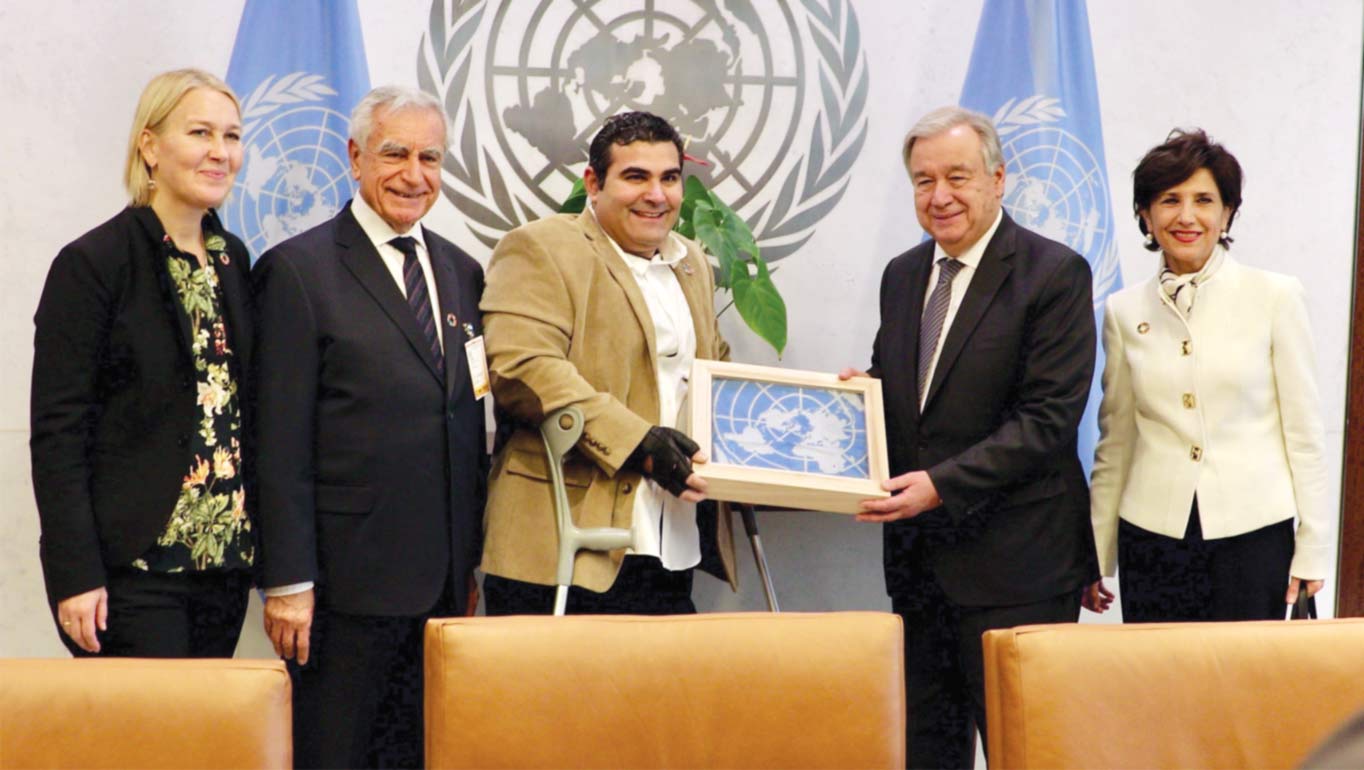Could you tell us about your journey ‘My Global Citizenship Leadership Walks for a Better Tomorrow’?
Due to a jet ski accident when I was six, 75% of my body is paralysed from the chest down. However, contrary to the laws of medicine, I achieved mobility! As typical young boy, I wanted to pursue sports and play with my friends. So, I defied logic and conquered my disability. Using the power of the mind fueled with determination, faith, and will, I focused on one goal…to walk. I needed to be mobile, I needed to be free, I needed to live a ‘normal’ life outside of the wheelchair, and this is what I accomplished. Using primitive technology at first, I devised my unique “swing-through gait” method and, against all odds, I ‘walked’ in my own, strange way. It took me beyond the wheelchair, into a journey of numerous ‘walks’ intended to change the world for the better.
I work with diverse scientific teams from the Lebanese American University (LAU), American University of Beirut (AUB), and other global institutions to enhance the exoskeleton technologies. I use to increase the mobility of other people with similar injuries. The core of this work is the exploration of human brain potential and its role in overcoming disability through ultra-performance outcomes, and my ‘walks’ serve to demonstrate how technology and climate action are linked.
On the way, I have gained three world records in walking, climbing, and snowshoeing. I took 60,000 ‘steps’, or 19 km, in the mountains of Lebanon, climbed the Raouche Rock, and snowshoed the Black Summit, proving that disability is only a state of mind. The real disability rests with our collective inability to take real climate action.
As UNDP Goodwill Ambassador, I ‘walk’ to emphasise the importance of inclusiveness in our Lebanese and Arab fabric at the heart of our rebuilding efforts. On October 4, 2020, I supported the #Beirutwalk4Inclusion iniative, co-led by UNDP and ESCWA, and in close coordination with UNICEF and UNHCR, to help persons with disabilities reduce their exposure to increasing vulnerabilities due to Lebanon’s crises — dwindling economy, COVID-19, and, most recently, the Beirut Port explosion.
This was followed by my 8000-step, 4 km journey and the UNDP ‘Stepping Ahead of COVID-19’ initiative #cairowalk4inclusion aiming at improving ‘tomorrow’ for people with disabilities. This initiative was supported by civil society, ministers, UNICEF and WHO.
What is your role as UNDP Goodwill Ambassador?
I am focussed on two major initiatives: climate action and inclusion. We have now moved from Climate Emergency to Climate Crisis, a dire situation. We must, all of us, unite under one flag to save our planet…and now!
To that end, I am highlighting my upcoming Arctic Walk for Addressing the Klima Emergency (AWAKE) — planned for 2022 as UNDP’s Regional Goodwill Ambassador – with other initiatives framed within UNDP’s Climate Promise, to raise awareness on Arctic melt and climate advocacy. I may be paralysed from the chest down, but I am using my story to advocate for awareness of the Climate Emergency. My challenge is to carry the flag handed to me by the Untied Nations Secretary-General, and to communicate the SDG agenda using innovative technology and the UNDP and Achim Steiner leadership’s support to do things ‘out of the box’. I must show ‘ability’.
I must therefore stress that the Arab States Region has the highest percentage of persons with disabilities as a result of conflict. Those are suffering from discrimination as well as lack of awareness and laws / policies to help them. There is so much to be done to help these people, and in my opinion this forms two major principles: firstly, to transform the work related to people with disabilities from that of philanthropy based on financial initiatives to actual rights based on laws; the second is to focus on the implementation of assistive technologies across the region — adequate ramps and access — that can empower those with disabilities to be mobile and integrated within the working framework of everyday society. Give people with disabilities rights and make technologies available. In my opinion, everything else lies within these pillars: training, advocacy, empowerment, and inclusion.
What message would you like to pass to people with disabilities?
We have reached an age in which technology is finally prevailing. What we previously considered to be ‘impossible’ is now more achievable than ever. We need to integrate 80-90 percent of these solutions within our community fabric to help people with disabilities and special needs. Once this is achieved, and in conjunction with the rule of law and ensuing rights within the framework of society, we can remove the barriers we face while allowing for the further development of assistive technologies. The youth leadership, disability leadership, and ‘general’ leadership, all need to collaborate in this initiative. In other words, people with disabilities could not only be integrated within society, but could also actively participate, and this is something we are fighting for. We want to raise adequate awareness for people with disabilities to be truly empowered and part of society’s decision-making process. My role is to work within this institution, to empower others in moving forward and creating such communities and, in turn, society.



